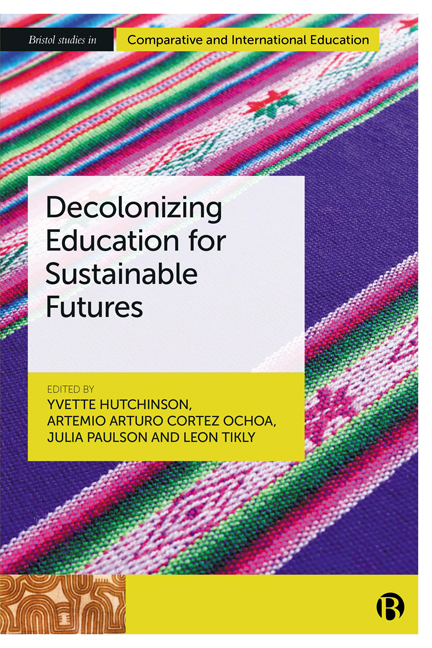Book contents
- Frontmatter
- Contents
- Series Editor Preface
- List of Figures and Table
- List of Abbreviations
- Notes on Contributors
- Acknowledgements
- Introduction
- PART I Connecting Decolonial and Sustainable Futures in Education
- PART II Decolonizing Education for Sustainable Futures: From Theory to Practice
- PART III Education’s Reparative Possibilities: Responsibilities and Reckonings for Sustainable Futures
- Conclusion
- Afterword
- Index
2 - Learning to Become With the World: Education for Future Survival
Published online by Cambridge University Press: 18 January 2024
- Frontmatter
- Contents
- Series Editor Preface
- List of Figures and Table
- List of Abbreviations
- Notes on Contributors
- Acknowledgements
- Introduction
- PART I Connecting Decolonial and Sustainable Futures in Education
- PART II Decolonizing Education for Sustainable Futures: From Theory to Practice
- PART III Education’s Reparative Possibilities: Responsibilities and Reckonings for Sustainable Futures
- Conclusion
- Afterword
- Index
Summary
If our species does not survive the ecological crisis, it will probably be due to our failure to imagine and work out new ways to live with the earth … We will go onwards in a different mode of humanity, or not at all
Val Plumwood, ‘A review of Deborah Bird Rose's “Reports from a Wild Country: Ethics for Decolonisation”’, 2007Introduction: education for future survival
We live in a critical moment of epochal transition from the Holocene into the Anthropocene (‘the Age of Man’), in which human forces have fundamentally altered the planet's geo/biospheric systems, triggering a cascade of ecological crises and threatening the future of life on Earth as we have known it, including that of our own species (Crutzen, 2002; Steffen et al, 2007). As our carbon emissions continue to overheat the planet, we face a climatic trajectory of intensifying floods, droughts and fires (IPCC, 2018). As we continue to clear forests, destroy habitats, and diminish biodiversity, we precipitate mass displacements and extinctions and create the conditions for ongoing, devastating, zoonotic pandemics (Grandcolas and Justine, 2020). Without the will to redress the root causes of the Anthropocene, we are now suffering the tragic consequences. Like Plumwood (2007), we believe that first and foremost this is indicative of our failure to imagine alternative ways of living with the Earth.
Education is directly implicated in the crises of the Anthropocene and our failure to imagine alternatives. Despite efforts to promote education as key to achieving sustainable lives, schools and higher education systems continue to prioritize workforce supply for economic growth over environmental sustainability. The Cartesian dualisms that structure our curricula and pedagogies are instrumental in perpetuating the delusion that we are somehow separate from the world around us and can act upon it with impunity (Taylor and Pacini-Ketchabaw, 2018). The fact that the world has the highest number of ‘educated’ people in its history and yet is the nearest to ecological breakdown is a stark reminder that ‘more of the same kind of education will only compound our problems’ (Orr, 2011, p 238; see also Komatsu et al, 2020; Rappleye and Komatsu, 2020; Silova, 2020).
- Type
- Chapter
- Information
- Decolonizing Education for Sustainable Futures , pp. 49 - 66Publisher: Bristol University PressPrint publication year: 2023

